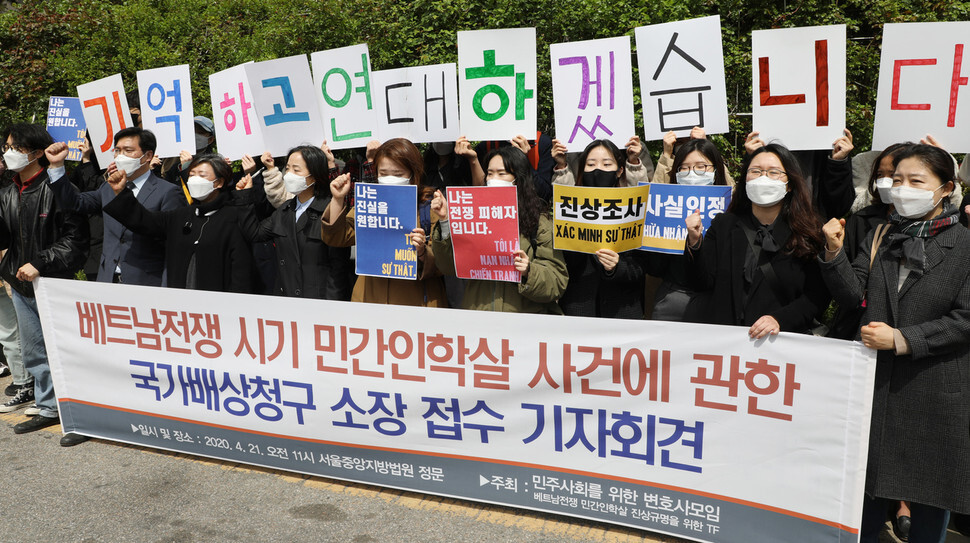hankyoreh
Links to other country sites 다른 나라 사이트 링크
S. Korea faces 1st lawsuit filed by victim of civilian massacres during Vietnam War

The South Korean government is facing the first state compensation lawsuit filed by a victim of civilian massacres perpetrated by South Korean troops during the Vietnam War. On Apr. 21, a task force organized by MINBYUN—Lawyers for a Democratic Society to investigate the massacres filed a lawsuit with the Seoul Central District Court on behalf of a 60-year-old massacre survivor named Nguyen Thi Thanh, asking the South Korean government to pay Nguyen 30 million won (US$24,261) in damages.
During a press conference held in front of the court by MINBYUN on Tuesday, Nguyen made the following remarks via a video call. “The only way to ease the pain of the victims is for the South Korean government to acknowledge its responsibility for the civilian massacres. I hope that the reputations of many victims, including my own reputation, will be restored.”
In February 1968, Nguyen, then eight years old, was seriously injured when she suffered a gunshot wound on her left side. She had been shot by troops from the 1st Company of the 1st Battalion of South Korea’s 2nd Marine Division, also known as the Blue Dragons, near her home in the village of Phong Nhi, in Dien Ban Township, Dien An District, Quang Nam Province. While doctors were able to save Nguyen’s life, her injury continues to affect her today. Five members of Nguyen’s family were killed in the massacre, and her 14-year-old brother was seriously injured.
In April 2018, Nguyen was one of the plaintiffs in a citizens’ tribunal aimed at uncovering the truth about the civilian massacres during the Vietnam War. The non-binding tribunal was organized by MINBYUN and the Korea-Vietnam Peace Foundation. The judges in the tribunal, led by former Supreme Court Justice Kim Young-ran, ordered the South Korean government to compensate the plaintiffs and give them an official apology “so as to restore their dignity and their reputation.”
One year later, Nguyen and 102 other victims submitted a petition to the Blue House asking for it to investigate the incidents in question. But the official position of South Korea’s Ministry of National Defense, representing the government, is that the military’s records don’t contain any information about civilian massacres by South Korean soldiers stationed in Vietnam.
S. Korean troops reportedly massacred some 9,000 civilians in 80 sites during Vietnam War
But there is an official record of the massacre in Phong Nhi that Nguyen has recounted — namely, an audit report by the US military, which states that 69 people were killed in the incident. South Korean troops massacred an estimated 9,000 civilians in 80 sites during the Vietnam War.
During the upcoming trial, the South Korean government and Nguyen are expected to debate whether it was actually South Korean troops that carried out the massacre. Another contentious point is whether a Vietnamese citizen has the right to sue the South Korean government for state compensation, as a South Korean citizen can. And considering that lawsuits for state compensation are supposed to be filed within five years of the date when the illegal action occurred, the statute of limitations is also likely to come up for debate: the Vietnam War ended in 1975, 45 years ago.
By Joh Yun-yeong, staff reporter
Please direct comments or questions to [english@hani.co.kr]

Editorial・opinion
![[Column] Season 2 of special prosecutor probe may be coming to Korea soon [Column] Season 2 of special prosecutor probe may be coming to Korea soon](https://flexible.img.hani.co.kr/flexible/normal/500/300/imgdb/original/2024/0426/3317141030699447.jpg) [Column] Season 2 of special prosecutor probe may be coming to Korea soon
[Column] Season 2 of special prosecutor probe may be coming to Korea soon![[Column] Park Geun-hye déjà vu in Yoon Suk-yeol [Column] Park Geun-hye déjà vu in Yoon Suk-yeol](https://flexible.img.hani.co.kr/flexible/normal/500/300/imgdb/original/2024/0424/651713945113788.jpg) [Column] Park Geun-hye déjà vu in Yoon Suk-yeol
[Column] Park Geun-hye déjà vu in Yoon Suk-yeol- [Editorial] New weight of N. Korea’s nuclear threats makes dialogue all the more urgent
- [Guest essay] The real reason Korea’s new right wants to dub Rhee a founding father
- [Column] ‘Choson’: Is it time we start referring to N. Korea in its own terms?
- [Editorial] Japan’s rewriting of history with Korea has gone too far
- [Column] The president’s questionable capacity for dialogue
- [Column] Are chaebol firms just pizza pies for families to divvy up as they please?
- [Column] Has Korea, too, crossed the Rubicon on China?
- [Correspondent’s column] In Japan’s alliance with US, echoes of its past alliances with UK
Most viewed articles
- 1Is Japan about to snatch control of Line messenger from Korea’s Naver?
- 2‘We must say no’: Seoul defense chief on Korean, USFK involvement in hypothetical Taiwan crisis
- 3The dream K-drama boyfriend stealing hearts and screens in Japan
- 4[Editorial] Korea’s surprise Q1 growth requires objective assessment, not blind fanfare
- 5Division commander ordered troops to enter raging flood waters before Marine died, survivor says
- 6No good, very bad game for Korea puts it out of Olympics for first time since 1988
- 7S. Korea “monitoring developments” after report of secret Chinese police station in Seoul
- 8[Editorial] New weight of N. Korea’s nuclear threats makes dialogue all the more urgent
- 9[Reportage] On US campuses, student risk arrest as they call for divestment from Israel
- 10[Reporter’s notebook] To accept migrants isn’t enough — Korea must fight their exploitation